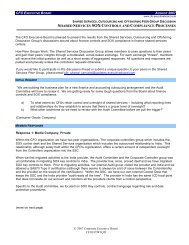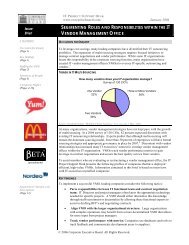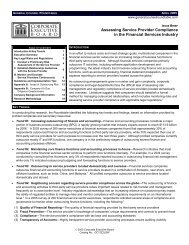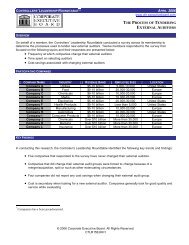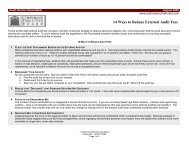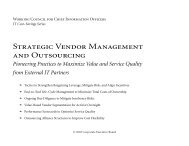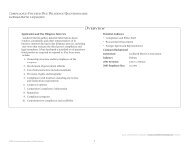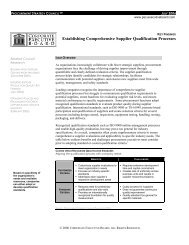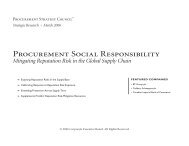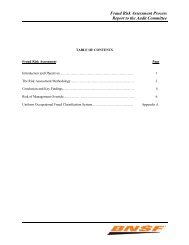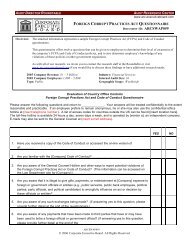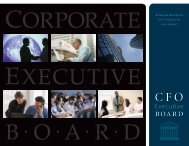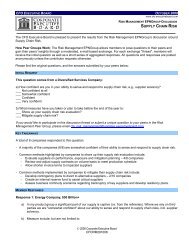compliance and ethics training programs for the board of directors
compliance and ethics training programs for the board of directors
compliance and ethics training programs for the board of directors
You also want an ePaper? Increase the reach of your titles
YUMPU automatically turns print PDFs into web optimized ePapers that Google loves.
COMPLIANCE AND ETHICS LEADERSHIP COUNCIL FEBRUARY 2005www.celc.executive<strong>board</strong>.comPrimary BriefCOMPLIANCE AND ETHICS TRAINING PROGRAMSFOR THE BOARD OF DIRECTORSOccasion <strong>for</strong> DiscussionTable <strong>of</strong> ContentsExecutive Summary 1Introduction 2Participants 3Assessing Board TrainingNeeds3-4Training Deployment <strong>and</strong>Frequency4-6Training Attendance 6Research Methodology<strong>and</strong> Agenda7The November 1, 2004 amendments to <strong>the</strong> Federal Sentencing Guidelines (FSG) raisenumerous questions about <strong>the</strong>ir breadth <strong>and</strong> applicability. Those questions includequeries into <strong>the</strong> meaning <strong>of</strong> Sections 8B2.1(b)(2)(A) <strong>and</strong> 8B2.1(b)(4)(A) which addressa Board <strong>of</strong> Directors’ responsibility <strong>for</strong> oversight <strong>of</strong> <strong>the</strong> organization’s <strong>compliance</strong> <strong>and</strong><strong>ethics</strong> program, as well as <strong>the</strong> organization’s responsibility <strong>for</strong> communicating <strong>the</strong>st<strong>and</strong>ards <strong>and</strong> procedures <strong>of</strong> its <strong>compliance</strong> <strong>and</strong> <strong>ethics</strong> program by “conducting effective<strong>training</strong> <strong>programs</strong> <strong>and</strong> o<strong>the</strong>rwise disseminating in<strong>for</strong>mation appropriate to <strong>the</strong> [Board <strong>of</strong>Directors’] roles <strong>and</strong> responsibilities.”Companies take different approaches to fulfill this <strong>training</strong> requirement. While <strong>the</strong> vastmajority periodically report to <strong>the</strong> <strong>board</strong> on <strong>compliance</strong> <strong>and</strong> <strong>ethics</strong> matters, somecompanies are implementing <strong>for</strong>mal <strong>compliance</strong> <strong>and</strong> <strong>ethics</strong> <strong>training</strong> <strong>programs</strong>. TheCouncil pr<strong>of</strong>iles a number <strong>of</strong> <strong>the</strong>se <strong>for</strong>mal <strong>training</strong> <strong>programs</strong> in this report.The Council selected <strong>the</strong> research participants from a group that previously participatedin related research with <strong>the</strong> Council, indicating that <strong>the</strong>y ei<strong>the</strong>r implemented a <strong>for</strong>mal<strong>training</strong> program or were planning to in <strong>the</strong> near future. As a result, this brief does notpresent a representative sample <strong>of</strong> companies.Key Findings The Majority <strong>of</strong> Firms Do Not Have Formal Compliance <strong>and</strong> Ethics Training For DirectorsWhen asked what process <strong>the</strong>ir company has in place to ensure <strong>the</strong> <strong>board</strong> exercises reasonable oversight <strong>of</strong> <strong>the</strong><strong>compliance</strong> <strong>and</strong> <strong>ethics</strong> program, 95% <strong>of</strong> firms reported a periodic reporting relationship to <strong>the</strong> <strong>board</strong>. Only 24% <strong>of</strong>firms have <strong>for</strong>mal <strong>compliance</strong> <strong>training</strong> <strong>programs</strong> ei<strong>the</strong>r in place or under development. 1 This may be because <strong>board</strong>sdo not call <strong>for</strong> <strong>for</strong>mal <strong>compliance</strong> <strong>and</strong> <strong>ethics</strong> <strong>training</strong>, preferring instead to spend <strong>the</strong>ir time learning about <strong>the</strong>specifics <strong>of</strong> <strong>the</strong> program during regular meetings with <strong>the</strong> Compliance <strong>and</strong> Ethics Officer. Established Compliance Programs Are Less Likely To Use a Formal Training ProgramIt is less likely that established <strong>compliance</strong> <strong>and</strong> <strong>ethics</strong> <strong>programs</strong> will incorporate a <strong>for</strong>mal <strong>training</strong> program into <strong>the</strong>periodic reporting process because <strong>the</strong>y typically maintain deep, two-way communication with <strong>the</strong> <strong>board</strong>. Inversely, anewer program, which has had less regular interaction with <strong>the</strong> <strong>board</strong>, is more likely to implement a <strong>for</strong>mal <strong>training</strong>program to “jumpstart” discussion around <strong>compliance</strong> <strong>and</strong> <strong>ethics</strong> issues. The Revised Federal Sentencing Guidelines Can Serve as a Lever to Increase Interaction with <strong>the</strong> BoardOf <strong>the</strong> 65% <strong>of</strong> Compliance <strong>and</strong> Ethics Officers who have a reporting relationship with <strong>the</strong> Board <strong>of</strong> Directors, twothirdsreport to <strong>the</strong> Audit Committee <strong>and</strong> 18% report to <strong>the</strong> full <strong>board</strong>. 2 This direct <strong>and</strong> independent access to <strong>the</strong><strong>board</strong> enables Compliance <strong>and</strong> Ethics Officers to build honest <strong>and</strong> robust dialog about <strong>the</strong> program <strong>and</strong> helps <strong>directors</strong>to ask <strong>and</strong> receive <strong>the</strong> right questions <strong>and</strong> answers.12General Counsel Roundtable, Mapping Compliance Programs to <strong>the</strong> Federal Sentencing Guidelines Amendments, Washington, D.C.: Corporate Executive Board(2004).Compliance <strong>and</strong> Ethics Leadership Council, Size <strong>and</strong> Reporting Relationships <strong>for</strong> <strong>the</strong> Compliance <strong>and</strong> Ethics Function, Washington, D.C.:Corporate Executive Board (2004).©2005 Corporate Executive BoardCatalog No.:CELC130M8AD
COMPLIANCE AND ETHICS LEADERSHIP COUNCILCompliance <strong>and</strong> Ethics Training Programs <strong>for</strong> <strong>the</strong> Board <strong>of</strong> DirectorsPAGE 2IntroductionThe Guidelines impose ultimate responsibility <strong>for</strong> <strong>the</strong> <strong>compliance</strong> <strong>and</strong> <strong>ethics</strong> program on an organization's governingauthority, typically <strong>the</strong> Board <strong>of</strong> Directors. Thus, <strong>the</strong> amendments require that <strong>the</strong> <strong>board</strong> stay in<strong>for</strong>med <strong>of</strong> <strong>the</strong> content <strong>and</strong>operations <strong>of</strong> <strong>the</strong> <strong>compliance</strong> <strong>and</strong> <strong>ethics</strong> program <strong>and</strong> exercise reasonable oversight <strong>of</strong> <strong>the</strong> program.Council research identifies two key practices, <strong>board</strong> <strong>of</strong> director <strong>training</strong> <strong>and</strong> <strong>board</strong> reporting, which may improve <strong>board</strong>oversight <strong>of</strong> <strong>the</strong> <strong>compliance</strong> <strong>and</strong> <strong>ethics</strong> program. Of 41 members surveyed regarding <strong>the</strong>ir method <strong>of</strong> ensuring <strong>board</strong>oversight, 24% <strong>of</strong> companies provide <strong>compliance</strong> <strong>and</strong> <strong>ethics</strong> <strong>training</strong> <strong>for</strong> <strong>the</strong> <strong>board</strong> <strong>and</strong> 95% <strong>of</strong> companies present periodicreports to <strong>the</strong> <strong>board</strong> concerning <strong>compliance</strong> <strong>and</strong> <strong>ethics</strong>. The following graph presents <strong>the</strong> methods companies engage tokeep <strong>directors</strong> apprised <strong>of</strong> <strong>compliance</strong> <strong>and</strong> <strong>ethics</strong> activities:Board Oversight Method*100%95%50%24%15%0%PeriodicReporting to<strong>the</strong> BoardComplianceTrainingO<strong>the</strong>r*Companies may select more than one response. n = 41Source: General Counsel Roundtable, Mapping Compliance Programs to <strong>the</strong> Federal Sentencing Guidelines AmendmentsThe Council defines <strong>training</strong> as any activity used to in<strong>for</strong>m <strong>the</strong> <strong>board</strong> on <strong>compliance</strong> <strong>and</strong> <strong>ethics</strong> matters beyond traditionalreporting. This typically involves <strong>for</strong>mal presentations by internal experts (e.g., Compliance <strong>and</strong> Ethics Officer) orexternal consultants or counsel.Council staff contacted participants from <strong>the</strong> pool <strong>of</strong> companies that indicated <strong>the</strong>y provide <strong>compliance</strong> <strong>training</strong>. Thisbrief contains in<strong>for</strong>mation on <strong>the</strong> assessment <strong>of</strong> <strong>board</strong> <strong>training</strong> needs <strong>and</strong> <strong>the</strong> development <strong>of</strong> <strong>compliance</strong> <strong>and</strong> <strong>ethics</strong><strong>training</strong> <strong>programs</strong> <strong>for</strong> <strong>the</strong> Board <strong>of</strong> Directors.©2005 Corporate Executive Board
COMPLIANCE AND ETHICS LEADERSHIP COUNCILCompliance <strong>and</strong> Ethics Training Programs <strong>for</strong> <strong>the</strong> Board <strong>of</strong> DirectorsPAGE 3ParticipantsCOMPANY BACKGROUND INFORMATIONCOMPANY INDUSTRY REVENUE EMPLOYEESCompany A* Electronics Less than $5 billion 10,000 – 20,000Company B* Health Care Products Less than $5 billion 10,000 – 20,000Company C* Non-Banking Financial Less than $5 billion 5,000 – 10,000Company D* Energy & Utilities $20 billion - $50 billion 20,000 – 60,000Company E* $10 billion - $20 billion 60,000 – 100,000RetailCompany F*Less than $5 billion 20,000 – 60,000Company G* Chemicals $5 billion - $10 billion 10,000 – 20,000Company H* Health Care Products Less than $5 billion 10,000 – 20,000*PseudonymAssessing Board Compliance <strong>and</strong> Ethics Training NeedsTo be both engaging <strong>and</strong> successful, a <strong>training</strong> program requires a preliminary assessment <strong>of</strong> needs. Generally, <strong>the</strong>Compliance <strong>and</strong> Ethics Officer is responsible <strong>for</strong> assessing <strong>training</strong> needs, through ei<strong>the</strong>r personal knowledge <strong>of</strong> <strong>the</strong><strong>board</strong>, or by gauging director reaction to issues that external experts introduce. The <strong>board</strong> exercises significant influenceover <strong>the</strong> material presented to <strong>the</strong>m, though <strong>the</strong> Compliance <strong>and</strong> Ethics Officer or General Counsel temper this advice.Council research explores several methods to per<strong>for</strong>m this director assessment in <strong>the</strong> area <strong>of</strong> <strong>compliance</strong> <strong>and</strong> <strong>ethics</strong>.Descriptions <strong>of</strong> participating companies’ assessment practices follow:• Company A does not have a <strong>for</strong>malized education program; in<strong>for</strong>mation concerning <strong>ethics</strong> <strong>and</strong> <strong>compliance</strong> isdelivered via <strong>the</strong> General Counsel, Compliance Officer, Secretary <strong>of</strong> <strong>the</strong> Board; he has a longst<strong>and</strong>ing relationshipwith <strong>the</strong> <strong>board</strong> <strong>and</strong> it is his responsibility to decide which in<strong>for</strong>mation concerning <strong>compliance</strong> <strong>and</strong> <strong>ethics</strong> toin<strong>for</strong>mally present. This decision is also influenced by how <strong>the</strong> <strong>board</strong> is self-assessing; <strong>directors</strong> conduct annualself-assessments, which primarily consist <strong>of</strong> questions about corporate governance.Several questions explore <strong>the</strong> <strong>compliance</strong> <strong>and</strong> <strong>ethics</strong> terrain <strong>and</strong> <strong>the</strong> General Counsel, Compliance Officer,Secretary <strong>of</strong> <strong>the</strong> Board reviews <strong>the</strong> answers to <strong>the</strong>se questions to determine whe<strong>the</strong>r targeted <strong>training</strong> may beneeded in a particular area. The <strong>board</strong> conducted its second self-assessment last year, <strong>and</strong>, though <strong>the</strong> GeneralCounsel, Compliance Officer, Secretary <strong>of</strong> <strong>the</strong> Board would like to include <strong>compliance</strong> <strong>and</strong> <strong>ethics</strong>-specificquestions this year, he will likely be <strong>for</strong>ced to wait <strong>for</strong> 2006. He may suggest that an interim assessment,specifically focused on <strong>compliance</strong> <strong>and</strong> <strong>ethics</strong>, be completed by <strong>the</strong> <strong>board</strong> later this year.• At Company B, <strong>the</strong> Vice President <strong>of</strong> Global Compliance trains <strong>the</strong> <strong>board</strong> in <strong>compliance</strong> <strong>and</strong> <strong>ethics</strong> matters. Sheworks with <strong>the</strong> CEO <strong>and</strong> several <strong>directors</strong> to determine <strong>board</strong> <strong>training</strong> needs. The backdrop to <strong>the</strong>se conversationsis <strong>the</strong> joint underst<strong>and</strong>ing that <strong>the</strong> <strong>directors</strong> should be familiar with <strong>the</strong> Code <strong>of</strong> Business Conduct, especially <strong>for</strong>areas (e.g., product complaints, advertising <strong>and</strong> marketing) that pose significant <strong>compliance</strong> risk to <strong>the</strong>organization.• Company C uses an external agent to annually assess its <strong>board</strong>'s in<strong>for</strong>mation <strong>and</strong> <strong>training</strong> needs. Also, <strong>the</strong><strong>directors</strong> complete a bi-annual assessment <strong>of</strong> <strong>the</strong>ir peers, which can reveal <strong>compliance</strong> <strong>and</strong> <strong>ethics</strong> knowledge gaps.• Company F <strong>directors</strong> partly set <strong>the</strong> agenda by asking <strong>for</strong> in<strong>for</strong>mation <strong>the</strong>y deem necessary to more effectivelyoversee <strong>the</strong> <strong>compliance</strong> <strong>and</strong> <strong>ethics</strong> program. The General Counsel, who is well-in<strong>for</strong>med on <strong>the</strong> legal <strong>and</strong>regulatory issues impacting <strong>the</strong> company, determines <strong>the</strong> remaining items.©2005 Corporate Executive Board
COMPLIANCE AND ETHICS LEADERSHIP COUNCILCompliance <strong>and</strong> Ethics Training Programs <strong>for</strong> <strong>the</strong> Board <strong>of</strong> DirectorsPAGE 64Assessing Board Compliance <strong>and</strong> Ethics Training Needs (Continued)Training fatigue <strong>and</strong> in<strong>for</strong>mation overload are concerns. Involving <strong>the</strong> <strong>board</strong> in <strong>the</strong> selection <strong>of</strong> <strong>training</strong> topics partiallyalleviates this risk. Also, <strong>the</strong> <strong>board</strong> is most effectively engaged through “real life” examples <strong>of</strong> issues being addressed by<strong>the</strong> <strong>compliance</strong> <strong>and</strong> <strong>ethics</strong> program; this in<strong>for</strong>mation (e.g., roll out new <strong>training</strong> modules to business practice <strong>of</strong>ficers inAustralia, completion <strong>of</strong> audits with respect to antitrust <strong>compliance</strong>, initiation <strong>of</strong> a round <strong>of</strong> risk assessments) should beincluded in <strong>the</strong> <strong>training</strong> program.• The Vice President <strong>of</strong> Global Compliance at Company B discusses <strong>the</strong> appropriateness <strong>of</strong> a topic with <strong>the</strong> CEO,<strong>and</strong> cuts out general in<strong>for</strong>mation on <strong>ethics</strong> to focus on issues particular to <strong>the</strong> medical devices industry, dealingwith variations in global regulations <strong>and</strong> <strong>the</strong> specifics <strong>of</strong> advertising <strong>and</strong> promotion as well as complaint-h<strong>and</strong>ling.• Company E focuses on <strong>training</strong> content that covers recent regulatory <strong>and</strong> legal developments as well as issuesspecific to <strong>the</strong> retail industry. The company underst<strong>and</strong>s that compelling education cannot be a regurgitation <strong>of</strong>general <strong>compliance</strong> <strong>and</strong> <strong>ethics</strong> topics that could be covered in o<strong>the</strong>r <strong>for</strong>ums.Training Deployment <strong>and</strong> FrequencyMany <strong>of</strong> <strong>the</strong> companies interviewed are currently in <strong>the</strong> process <strong>of</strong> implementing <strong>for</strong>mal <strong>training</strong> <strong>programs</strong>. Descriptions<strong>of</strong> <strong>the</strong>se companies implementation plans follow below.Company B’s Vice President <strong>of</strong> Global Compliance trains <strong>the</strong> <strong>board</strong>Company B’s first <strong>compliance</strong> <strong>and</strong> <strong>ethics</strong> <strong>training</strong> presentation took place July 2004; <strong>the</strong> company plans to make this anannual event. The Vice President <strong>of</strong> Global Compliance worked with <strong>the</strong> CEO <strong>and</strong> <strong>the</strong> Compliance Committee <strong>of</strong> <strong>the</strong>Board <strong>of</strong> Directors to devise <strong>the</strong> program <strong>and</strong> presented <strong>the</strong> in<strong>for</strong>mation. The PowerPoint presentation includes slidesexcerpted from internally-designed employee <strong>training</strong> modules.Company C uses internal subject matter experts to train <strong>the</strong> <strong>board</strong>Company C began conducting <strong>training</strong> sessions <strong>for</strong> <strong>the</strong> <strong>board</strong> in 2001. There are three <strong>of</strong> <strong>the</strong>se sessions per year, with oneor two <strong>of</strong> <strong>the</strong>m focusing on corporate governance, with an emphasis on <strong>ethics</strong> <strong>and</strong> <strong>compliance</strong>. Each session runsapproximately 45 minutes, but <strong>the</strong> company asks speakers to keep presentations to less than 25 minutes to allow sufficienttime <strong>for</strong> questions <strong>and</strong> discussion. Speakers are typically internal, those considered closest to <strong>the</strong> topic by management.The <strong>board</strong>, which drives <strong>the</strong> <strong>training</strong> agenda, evaluates all education sessions.Practice Spotlight: Web site Created <strong>for</strong> DirectorsCompany C developed a Web site specifically <strong>for</strong> its Board <strong>of</strong> Directors that contains all <strong>training</strong>presentation materials, <strong>board</strong> meeting minutes <strong>and</strong> documents pertaining to company policy. Both<strong>the</strong> Compliance <strong>and</strong> Legal functions post relevant articles.©2005 Corporate Executive Board
COMPLIANCE AND ETHICS LEADERSHIP COUNCILCompliance <strong>and</strong> Ethics Training Programs <strong>for</strong> <strong>the</strong> Board <strong>of</strong> DirectorsPAGE 5Training Deployment <strong>and</strong> Frequency (Continued)Company D asks its outside counsel to present at a <strong>board</strong> dinnerIn <strong>the</strong> process <strong>of</strong> <strong>for</strong>malizing its <strong>compliance</strong> <strong>and</strong><strong>ethics</strong> <strong>training</strong> program, Company D will hold aninitial <strong>training</strong> event in late February to sharpen<strong>the</strong> <strong>directors</strong>’ focus on <strong>the</strong>ir responsibility tosupport an ethical culture; Company D anticipatesthat this will encourage discussion around <strong>the</strong>topic <strong>and</strong> enable an assessment <strong>of</strong> areas to pursue<strong>for</strong> fur<strong>the</strong>r <strong>ethics</strong> <strong>training</strong> in August (<strong>and</strong> regularly<strong>the</strong>reafter). The <strong>ethics</strong> <strong>training</strong> will involve <strong>the</strong><strong>board</strong> getting first h<strong>and</strong> knowledge <strong>of</strong> <strong>the</strong> <strong>training</strong>given to employees, as well as discussion around anumber <strong>of</strong> “what if…?” scenarios specific toCompany D’s business.Practice Spotlight: Food <strong>for</strong> ThoughtThe February <strong>training</strong> will be given by anexternal attorney who will decide <strong>the</strong> content<strong>of</strong> <strong>the</strong> presentation with <strong>the</strong> help <strong>of</strong> CompanyD’s legal team. This attorney worksextensively with Company D <strong>and</strong> is veryfamiliar with its business. The presentationitself will be given over dinner <strong>the</strong> nightbe<strong>for</strong>e <strong>the</strong> Board meeting to provide anin<strong>for</strong>mal venue <strong>for</strong> in-depth discussion.Compliance <strong>and</strong> <strong>ethics</strong> will not be on <strong>the</strong> <strong>board</strong> meeting agenda, but <strong>the</strong> previous evening’s presentation is expected t<strong>of</strong>oster discussion on <strong>the</strong> topic. Company D hopes to incorporate <strong>ethics</strong> <strong>training</strong> into all aspects <strong>of</strong> <strong>board</strong> education ra<strong>the</strong>rthan having specific sessions devoted to it. For instance, if an investment analyst presents to <strong>the</strong> <strong>board</strong>, <strong>the</strong> GeneralCounsel could <strong>the</strong>n speak about insider trading.Company E pairs an external consultant with a member <strong>of</strong> <strong>the</strong> <strong>board</strong>In June 2005, Company E will <strong>for</strong>malize its <strong>compliance</strong> <strong>and</strong> <strong>ethics</strong> Board <strong>of</strong> Director education by hosting two speakers atits <strong>board</strong> meeting. A <strong>compliance</strong> <strong>and</strong> governance expert from Harvard Business School will be <strong>the</strong> principle speaker. Hewill seek to foster discussion around general <strong>compliance</strong> <strong>and</strong> <strong>ethics</strong> issues. The second speaker, a current Company Edirector, will provide company specific context around <strong>the</strong> consultant’s session to <strong>the</strong> rest <strong>of</strong> <strong>the</strong> <strong>board</strong>.Company E will gauge director interest <strong>and</strong> knowledge <strong>of</strong> issues that speakers introduce <strong>and</strong> will assess future <strong>training</strong>needs based on how this first event unfolds. Board feedback will be incorporated into Company E’s ongoing <strong>training</strong>process.Company G tailors employee <strong>training</strong> modules <strong>for</strong> <strong>the</strong> <strong>board</strong>Company G developed a highly tailored <strong>board</strong> <strong>training</strong> program which occurs every o<strong>the</strong>r year. The spotlight practicebelow provides additional in<strong>for</strong>mation on Company G’s <strong>training</strong> program.Practice Spotlight: Tailoring Compliance TrainingCompany G presents <strong>the</strong> <strong>board</strong> a tailored <strong>compliance</strong> <strong>training</strong> program every two years. Legaldepartment attorneys in specialized areas (e.g., antitrust, regulatory, employment, intellectualproperty) present <strong>training</strong> modules on <strong>the</strong> code <strong>of</strong> conduct <strong>and</strong> company policies (e.g., fraud,employment, intellectual property, antitrust, document management). Company G believes <strong>the</strong><strong>board</strong> gains insight into <strong>the</strong> company-wide <strong>compliance</strong> <strong>training</strong> program through <strong>the</strong> tailored<strong>compliance</strong> <strong>training</strong> program.©2005 Corporate Executive Board
COMPLIANCE AND ETHICS LEADERSHIP COUNCILCompliance <strong>and</strong> Ethics Training Programs <strong>for</strong> <strong>the</strong> Board <strong>of</strong> DirectorsTraining Deployment <strong>and</strong> Frequency (Continued)Company H delivers employee <strong>training</strong> to <strong>the</strong> <strong>board</strong>Company H is <strong>the</strong> only pr<strong>of</strong>iled company that deploys <strong>the</strong> same <strong>training</strong> program to both <strong>the</strong> general employee population<strong>and</strong> <strong>the</strong> Board <strong>of</strong> Directors. Directors are required to participate. The spotlight practice below provides additionalin<strong>for</strong>mation on Company H’s <strong>training</strong> program.Practice Spotlight: M<strong>and</strong>atory Director TrainingDirectors at Company H receive <strong>the</strong> same m<strong>and</strong>atory <strong>compliance</strong> <strong>and</strong> <strong>ethics</strong> <strong>training</strong> that allemployees <strong>and</strong> on-site vendors receive. This general overview <strong>training</strong> rein<strong>for</strong>ces CompanyH’s commitment to corporate <strong>and</strong> individual integrity <strong>and</strong> is revised <strong>and</strong> redeployed every twoto three years.Training AttendanceOnly Company H requires director attendance at <strong>training</strong> sessions. Several companies cite near-perfect <strong>board</strong> meetingattendance rates, while o<strong>the</strong>rs believe it presumptuous to require participation. Most participating companies agree that ifa director were unavailable <strong>for</strong> a <strong>training</strong> session, both <strong>the</strong> personnel <strong>and</strong> materials would be made available should s/heask <strong>for</strong> a repeat <strong>of</strong> <strong>the</strong> session.Company A has conceived <strong>of</strong>, but not yet put in place, a company guideline that requires a certain amount <strong>of</strong> director<strong>training</strong>, whe<strong>the</strong>r completed in-house or at accredited seminars. Embedding questions about <strong>training</strong> into <strong>the</strong> selfassessmentprocess would enable Company A to determine which <strong>directors</strong> follow <strong>the</strong> guidelines.©2005 Corporate Executive Board
COMPLIANCE AND ETHICS LEADERSHIP COUNCILCompliance <strong>and</strong> Ethics Training Programs <strong>for</strong> <strong>the</strong> Board <strong>of</strong> DirectorsPAGE 7Research MethodologyIn an ef<strong>for</strong>t to ga<strong>the</strong>r in<strong>for</strong>mation regarding <strong>compliance</strong> <strong>and</strong> <strong>ethics</strong> <strong>training</strong> <strong>programs</strong> <strong>for</strong> <strong>the</strong> Board <strong>of</strong> Directors, Councilresearch staff examined multiple research databases <strong>and</strong> contacted member institutions to conduct primary research. It isour hope that this brief will provide Council members with a focused summary <strong>of</strong> popular wisdom on this issue.Research AgendaBusiness Purpose:The purpose <strong>of</strong> this research is to determine:a. The <strong>training</strong> needs <strong>of</strong> <strong>directors</strong> in <strong>the</strong> area <strong>of</strong> <strong>ethics</strong> <strong>and</strong> <strong>compliance</strong>b. How such <strong>training</strong> occursResearch Questions:1) How do companies assess <strong>board</strong> (<strong>compliance</strong> & <strong>ethics</strong>) <strong>training</strong> needs?a. Is <strong>training</strong> targeted to specific <strong>directors</strong> or committees (e.g., audit committee vs. executive compensation <strong>and</strong>management resources committee)?2) What are <strong>the</strong> different types <strong>of</strong> <strong>training</strong> provided?3) How <strong>of</strong>ten are <strong>directors</strong> trained?4) What is <strong>the</strong> method <strong>of</strong> deployment (e.g., expert speaker, online, video)?5) Is <strong>the</strong> <strong>training</strong> m<strong>and</strong>atory?a. If it is m<strong>and</strong>atory <strong>and</strong> a director refuses, what are <strong>the</strong> repercussions? Are <strong>the</strong>se made explicit?6) To what extent is outside <strong>training</strong> (e.g., <strong>training</strong> that a director might have received as part <strong>of</strong> a different company’s<strong>board</strong> or executive team) considered when developing your company’s strategy?7) Was <strong>the</strong> <strong>training</strong> organizationally driven or did <strong>the</strong> <strong>directors</strong> call <strong>for</strong> it <strong>the</strong>mselves?Pr<strong>of</strong>essional Services NoteThe Compliance <strong>and</strong> Ethics Leadership Council has worked to ensure <strong>the</strong> accuracy <strong>of</strong> <strong>the</strong> in<strong>for</strong>mation it provides to its members.This project relies upon data obtained from many sources, however, <strong>and</strong> <strong>the</strong> Compliance <strong>and</strong> Ethics Leadership Council cannotguarantee <strong>the</strong> accuracy <strong>of</strong> <strong>the</strong> in<strong>for</strong>mation or its analysis in all cases. Fur<strong>the</strong>rmore, <strong>the</strong> Compliance <strong>and</strong> Ethics Leadership Councilis not engaged in rendering legal, accounting, or o<strong>the</strong>r pr<strong>of</strong>essional services. Its projects should not be construed as pr<strong>of</strong>essionaladvice on any particular set <strong>of</strong> facts or circumstances. Members requiring such services are advised to consult an appropriatepr<strong>of</strong>essional. Nei<strong>the</strong>r Corporate Executive Board nor its <strong>programs</strong> are responsible <strong>for</strong> any claims or losses that may arise from anyerrors or omissions in <strong>the</strong>ir reports, whe<strong>the</strong>r caused by Corporate Executive Board or its sources.©2005 Corporate Executive Board



